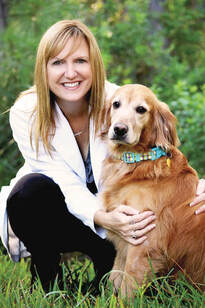|
We are experiencing an unprecedented global health crisis. In a world that feels largely out of control, what can we do to stay calm while facing so much uncertainty?
First and foremost, we must recognize that we are human and it is a normal human reaction to feel anxious and worried at a time like this. Whatever your style of coping, recognize that you are doing the best you can in a difficult situation. That being said, the following are a few techniques you may also find helpful. Challenge negative thinking: Our interpretation of a situation will create our experience of that situation. The reasons we are socially distancing are serious and scary, however, the experience of social distancing doesn’t have to be. Reframe this experience by giving yourself permission to enjoy this mandatory time out. Experience being at home, spend more time with family, brainstorm creative ways to connect with others without physically meeting up. We have the option to view this situation as a crisis as well as an opportunity. I would offer that most situations in life can be viewed, and treated, as both. Be mindful of your focus: Is a global pandemic terrifying? Yes. Is the divinely inspired human race amazing and resilient and brilliant when we work together for a common goal? Also, yes. As quickly as a crisis can manifest, it can also resolve. When our minds drift to worry about the future and the safety of our loved ones, we can affirm that there are brilliant minds around the world pooling their talents, skills, training, and abilities to identify a solution to this problem. By working together, we can and will overcome this problem. Ask, what’s in my control? We have been given a mission: practice social distancing. Limit non-essential travel. Work from home if we can. Wash our hands. Self-isolate if we experience symptoms of illness. These are the things we can control. Just as we can remind ourselves that a solution is on it’s way to us, we can also remind ourselves that, by doing our part, we are helping to bring that solution more quickly into reality. We must focus on what we can control, and then commit to doing it. We move forward with faith that the rest, which is not in our control, is also in progress by others who are capable and inspired to solve this problem. Denying difficult emotions does not prevent us from having them. Doing so, we bottle them up, stuff them down, and let them accumulate until they erupt in unhealthy ways and at inopportune times. Grounding is a skill that becomes stronger with practice. It begins when we give ourselves space and grace to feel difficult emotions. It works by challenging our unproductive, negative thoughts and reframing them with more helpful, productive thoughts instead. What we focus on increases so let's make sure we are focusing on the magic that is possible versus the fear that it's not. If you are experiencing increased anxiety during this difficult time, please visit our website at www.GoodMentalHealthLLC.com for access to relevant blog posts, local resources, or to schedule an appointment. For the safety of our community, all upcoming appointments will take place by phone or online via video chat.
0 Comments
by Dr Kathleen Deckard Pets R Family COVD-19 is at the forefront of everyone’s minds right now so I want to address some common questions about whether your pet may be affected by this virus.
What is COVID-19? While coronaviruses are common, COVID-19 is a new strain of coronavirus that had previously not been identified in humans. The key features of COVID-19 are respiratory symptoms with a fever and cough. Like all new infections, understanding COVID-19 is important with details coming in rapidly. Coronaviruses in pets have been around for a very long time. It is important to know that the coronavirus of infected dogs and cats cannot affect humans. Cats get their own coronavirus that typically causes either no clinical signs or very mild diarrhea. The feline coronavirus is also associated with another disease called feline infectious peritonitis, which is very serious. Similarly, dogs have their own coronavirus that can cause diarrhea, lethargy, and reduced appetite, but most dogs recover uneventfully with supportive care. Simply stated, cat and dog coronaviruses are very different than COVID-19. Can my pet get it? On February 27, 2020, news broke of a Pomeranian in Hong Kong that tested weak positive for COVID-19 from swabs obtained from the nose and mouth. It is important to note that it is highly unlikely that your pet would be able to harbor the virus on their fur since it is porous and fibrous. Veterinarians and human health officials have decided after many tests, that the affected dog had a low-level of infection that was likely to be a case of human-to-animal transmission. To be cautious, the dog was quarantined, but has never had clinical signs of illness. Based on currently available information, both the US Centers for Disease Control (CDC) and World Health Organization (WHO) report there is no evidence cats or dogs can spread COVID-19. Furthermore, there is also no evidence pets get sick from COVID-19. One of the world’s leading veterinary diagnostics firms tested thousands of dogs and cats for the new coronavirus, and not a single case came back positive. This backs up the theory that pets cannot catch or spread Covid-19. How Covid-19 could have an impact on available pet medications. According to the American Veterinary Medical Association, 32 animal drug companies either make their drugs or obtain ingredients for their drugs from China. The Food & Drug Administration (FDA) contacted all of these companies, and to date, none of them have reported drug shortages however shortages are anticipated in the future. What should I do? Although research is underway, there is no vaccine against COVID-19 currently available. Until we have an effective vaccine, we all need to exercise some common sense, including: Don’t panic! Stay informed – read unfiltered information from veterinarians as more data becomes available Thoroughly wash your hands with soap and water, including after handling / petting animals. This recommendation isn’t specific for COVID-19 – hand washing helps reduce the transmission of multiple infectious diseases! If you have COVID-19, restrict contact with pets and other animals. According to the American Veterinary Medical Association (AVMA), sick individuals should “avoid contact with animals, including petting, snuggling, being kissed or licked, and sharing food.” Another family member or friend should care for animals in the household whenever possible. The take-away message about COVID-19 and pets… The novel coronavirus COVID-19 is not thought to cause clinical disease in companion animals. As we learn more about this virus, you should keep abreast of any new information that is learned about the virus. Most veterinarians are staying open as essential providers of care for our pets and are taking proper precautions to limit person to person contact. These precautions include curbside service, shipment of medication to the home, delivery of food and medications, drop off appointments, telemedicine and phone consultations. Do not delay your pet’s care during this time. Contact your veterinarian for how they can help care for your pet during this challenging time. |
AuthorSt. Johns Magazine is your fun & friendly resource for the growing communities of northern St. Johns Archives
December 2021
Categories
All
|
Proudly powered by Weebly


 RSS Feed
RSS Feed
